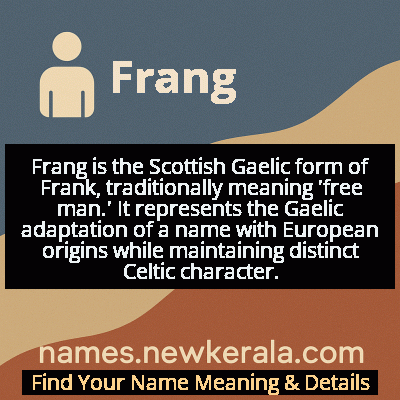Frang Name Meaning & Details
Origin, Popularity, Numerology Analysis & Name Meaning of Frang
Discover the origin, meaning, and cultural significance of the name FRANG. Delve into its historical roots and explore the lasting impact it has had on communities and traditions.
Name
Frang
Gender
Male
Origin
Gaelic
Lucky Number
1
Meaning of the Name - Frang
Frang is the Scottish Gaelic form of Frank, traditionally meaning 'free man.' It represents the Gaelic adaptation of a name with European origins while maintaining distinct Celtic character.
Frang - Complete Numerology Analysis
Your Numerology Number
Based on Pythagorean Numerology System
Ruling Planet
Sun
Positive Nature
Leaders, ambitious, highly driven, self-reliant, innovative.
Negative Traits
Overly aggressive, domineering, impatient, selfish.
Lucky Colours
Red, orange, gold.
Lucky Days
Sunday.
Lucky Stones
Ruby, garnet.
Harmony Numbers
2, 3, 9.
Best Suited Professions
Entrepreneurs, managers, engineers.
What People Like About You
Courage, determination, leadership.
Famous People Named Frang
Frang MacIntyre
Poet and Writer
Renowned Scottish Gaelic poet and author from the Isle of Skye
Frangag NicCoinnich
Musician and Cultural Activist
Prominent Gaelic singer and advocate for Scottish Gaelic language preservation
Frang MacThòmais
Educator and Linguist
Influential Gaelic teacher and contributor to modern Gaelic education
Name Variations & International Equivalents
Click on blue names to explore their detailed meanings. Gray names with will be available soon.
Cultural & Historical Significance
In Gaelic-speaking communities, Frang represents a bridge between traditional Celtic culture and wider European influences. The name gained particular prominence during the medieval period when Gaelic lords maintained diplomatic and military relationships with Frankish kingdoms. Today, it stands as a testament to Scotland's historical European connections and the adaptability of Gaelic language and culture in incorporating foreign elements while preserving its unique character.
Extended Personality Analysis
Individuals named Frang are often perceived as possessing a blend of traditional values and modern adaptability, reflecting the name's cross-cultural origins. They typically exhibit strong leadership qualities combined with diplomatic skills, able to navigate different social contexts with ease. Their personality often includes a deep respect for heritage and tradition, balanced with progressive thinking and openness to new ideas.
Common traits associated with Frang include reliability, intelligence, and cultural awareness. They tend to be excellent communicators who value both their roots and global perspectives. Many Frangs demonstrate natural curiosity about different cultures and histories, often becoming bridges between traditional communities and contemporary society. Their character typically combines the steadfastness of Gaelic tradition with the cosmopolitan outlook suggested by the name's Frankish origins.
Modern Usage & Popularity
In contemporary times, Frang maintains a niche but respected presence primarily within Gaelic-speaking communities in Scotland and among diaspora populations. The name has experienced a modest revival as part of the broader Gaelic language and cultural renaissance movement. While not among the most common Gaelic names, it holds appeal for parents seeking traditional names with European connections. Its usage remains strongest in the Scottish Highlands and Islands, particularly in areas with active Gaelic medium education. The name's rarity in mainstream culture adds to its appeal for those wanting a distinctive yet historically grounded name.
Symbolic & Spiritual Meanings
Symbolically, Frang represents cultural synthesis and the meeting of Celtic and European traditions. It embodies the concept of 'freedom' through its etymological connection to 'Frank' meaning free man, while also signifying cultural exchange and adaptation. The name carries connotations of bridge-building between different worlds – traditional and modern, local and global, Celtic and continental. It symbolizes the ability to maintain cultural identity while embracing external influences, making it a powerful emblem of cultural resilience and intercultural dialogue in the Gaelic context.

